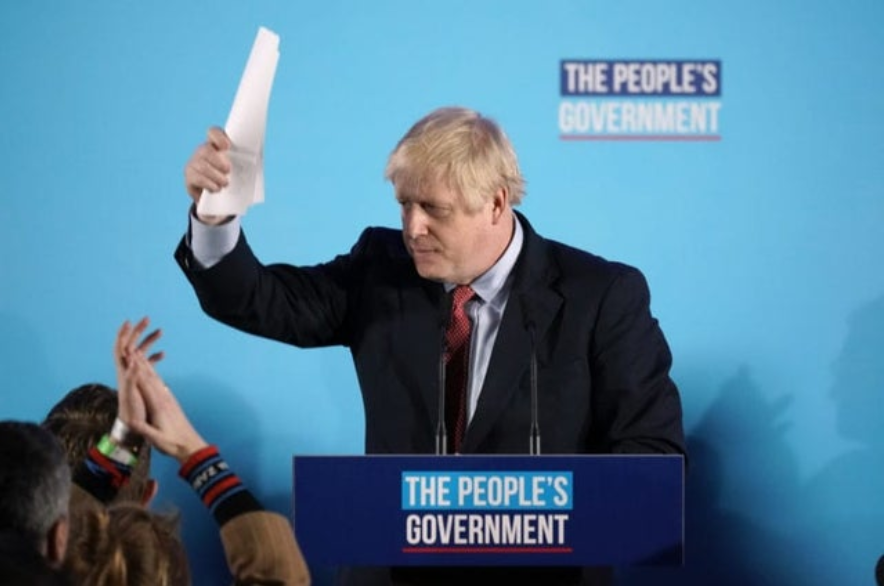 By Gavin Graham, Contributing Editor
By Gavin Graham, Contributing Editor
The result of the U.K. general election on Dec. 12 was a massive win for incumbent prime minister Boris Johnson and the Conservative party.
Campaigning on the slogan of “Get Brexit done”, Mr. Johnson smashed the so-called Red Wall of traditional Labour-voting seats in the Midlands and the North, winning an 80-seat majority with 364 seats in the 650 seat U.K. parliament.
The Conservatives won a 7% swing from Labour, condemning the opposition party to its worst result in over 80 years, with only 203 seats. Constituencies which had not voted Conservative since World War II, or in some cases since the 1920s and 1930s, went Tory with swings of 10-15%, as seats which had voted Leave in the 2016 referendum chose the party that promised to deliver on that result.
As I noted when discussing the U.K. political scene a couple of months ago, Mr. Johnson was forced to call an election as he lacked a majority in parliament to pass the withdrawal agreement he had negotiated with the EU in October.
In a major miscalculation, the Remain-supporting Liberal Democrats and Scottish Nationalists (SNP) agreed to allow parliament to be dissolved without a two-thirds majority, as required by the Fixed Term Parliament Act. They calculated they would benefit from Labour’s unpopularity under its hard-left leader, Jeremy Corbyn. He had refused to take a clear position on Brexit to avoid alienating either Labour’s traditional working-class seats in the North and Midlands, which voted to leave in the 2016 referendum, or the London and major city based Remain supporters who dominate the party.
The SNP certainly benefited from the election, taking 48 of the 59 seats in Scotland, up 13 from 2017 as Labour’s vote collapsed there too. The Liberal Democrats were unable to attract enough Remain supporters from Labour, ending up with only 12 seats, one fewer than in 2017. Their leader, Jo Swinson, was defeated when she lost her Scottish seat to the SNP. Interestingly, the Conservatives, who have been almost non-existent in Scotland since the 1980s, are now the second largest party there with seven seats and 20% of the vote, more than Labour.
After three and a half years of uncertainty since the referendum in June 2016, the U.K. now has a Conservative government with the biggest majority since the days of Margaret Thatcher in the 1980s. Boris Johnson has a clear mandate to exit the EU on Jan. 31, as promised.
Mr. Johnson has pledged to negotiate a new trade agreement with the EU by the end of 2020, while ensuring that the U.K. is no longer a member of the EU customs union or single market. The withdrawal agreement envisaged a customs border running down the Irish Sea to ensure that there was no physical border between Northern Ireland and the Irish Republic. With the size of this majority, Mr. Johnson can ignore protests from his former allies in the Democratic Unionist Party, who supported Theresa May’s minority government from 2017-19.
Now the same commentators who claimed Mr. Johnson could never re-negotiate Theresa May’s flawed withdrawal agreement to escape EU regulations are saying that it will be impossible to work out a complicated trade deal within eleven months. They point to the seven years it took Canada to agree a deal with the EU, but they forget that Mr. Johnson has shown, both with the withdrawal agreement and now with his smashing election victory, an ability to be flexible enough to obtain his objectives by surrendering a few minor issues. Investors should not bet against him getting a reasonable deal by the end of next year.
So what does this mean for your investments?
In October I recommended buying the iShares MSCI United Kingdon ETF (NYSE: EWU) at US$32.14. I described it as a defensive way to play developments in the U.K., given that 70% of the revenues and earnings are derived from outside the U.K. through exports and overseas subsidiaries. Plus, the U.K. market is reasonably priced. It hasn’t risen in the three years since the Brexit vote and yields almost 5%.
With the Conservative victory, the market took off. The pound rose over 2% against both U.S. dollar and the euro on the news and on Friday the mid-cap FTSE 250 shot up 5% to a record high. The EWU ETF rose 3% to $34.10, the smaller rise being due to its overseas exposure.
It’s up about 6% since being recommended two months ago and remains a Buy as pent-up money flows into the U.K.
Contributing editor Gavin Graham has enjoyed a long and successful career in money management and is a specialist in international securities. He held senior positions in financial organizations in London, Hong Kong, and Toronto. He is a Trustee of the Royal Medical Foundation Investment Committee. He divides his time between Toronto and the U.K.
This article originally appeared in the Internet Wealth Builder newsletter.
